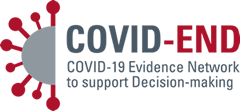Implementing guidance
Guideline development should unfold in light of the needs and constraints of guideline implementers, and ideally in collaboration with them. Over the last several years the US Centres for Disease Control and Prevention (CDC) has led the multi-stakeholder Adapting Clinical Guidelines for the Digital Age initiative (formerly available at https://www.cdc.gov/ddphss/clinical-guidelines/index.html) that has provided strategies and tools for doing this in an 'agile' fashion while making guidance computable. Building on this and related work, the US Agency for Healthcare Research and Quality (AHRQ) has formed the multi-stakeholder ACTS COVID-19 Guidance to Action Collaborative (formerly available at https://covid-acts.ahrq.gov/pages/viewpage.action?pageId=13605905). This Collaborative's goal is to help stakeholders in the US and other countries to improve the flow from COVID-19 studies to systematic reviews to guidelines to action and then to results that feed back into new evidence. A particular focus is ensuring that evidence-based living guidance is broadly applied to improve care delivery processes and outcomes. Collaborative participants are using the ‘Knowledge Ecosystem Recommendations page’ of the Collaborative’s website to synthesize recommended resources, best practices, tools, standards, etc. for each knowledge ecosystem step. This page is intended as a guide and 'front door' to knowledge ecosystem enhancement recommendations and includes pointers to resources from COVID-END (e.g., this document) and many other leading initiatives and organizations.
An updated section for implementing guidelines will be considered in future iterations.
COVID-19 has drastically changed the manner and speed in which evidence syntheses and guidelines are developed. It is now more important than ever that guidelines and health technology assessments produced are trustworthy and efficient, yet are delivered in a responsive manner to match evidence and policy needs. The concept of living evidence and guidance with dynamic updating of recommendations once new practice-changing evidence is publicly available has experienced a breakthrough during COVID-19. The need to collaborate closely on evidence syntheses and the creation and updating of high-quality evidence-based CPGs and HTAs are more important than ever, to increase efficiency and reduce the duplication of efforts. This warrants generous collaboration and sharing of evidence and guidance in a globally concerted effort. COVID-END and the recommending working group remain devoted to achieving this goal.
This resource is a work in progress.
For any comments or suggestions please contact covidend@mcmaster.ca.
Download a PDF of 'Resources and tools for guideline developers, health technology assessment teams and decision makers.'
